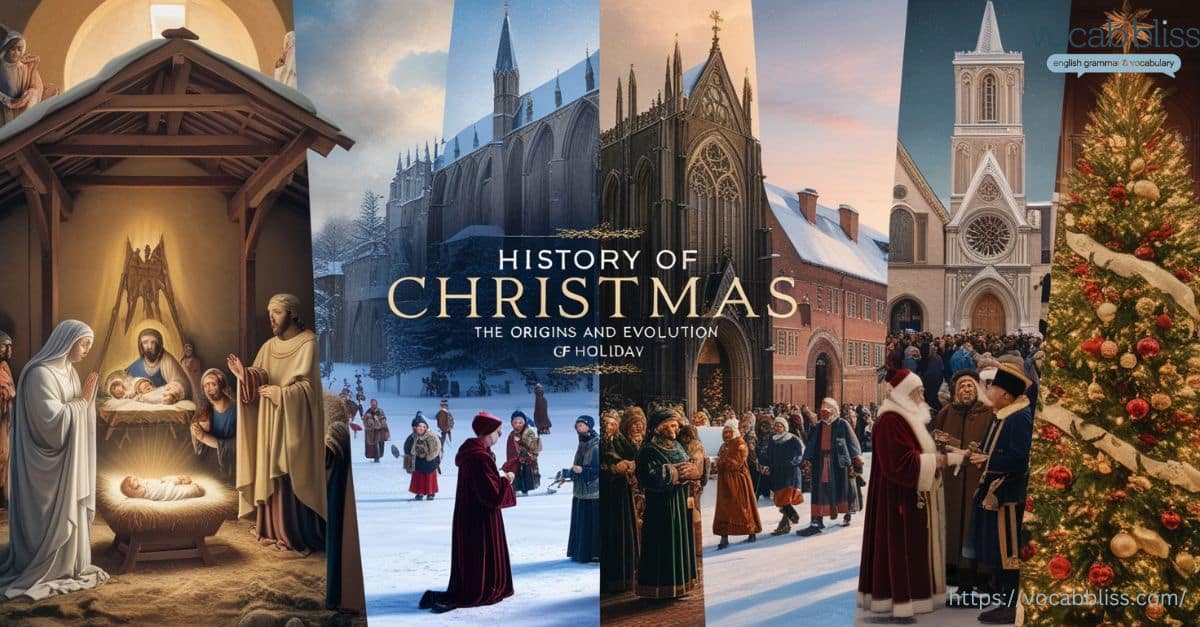The holiday season often brings joy, traditions, and—let’s face it—grammar puzzles. One of the most debated questions revolves around spelling and grammatical usage: How do you spell Christmas, Christmases, or Christmas’s? This guide will explore the linguistic nuances, grammar rules, and practical examples to ensure your holiday writing is precise and professional.
Whether you’re sending a family newsletter, crafting professional emails, or penning creative stories, understanding the difference between these forms will make your communication shine like a Christmas star.
Quick Summary
Understanding how do you spell Christmas, Christmases, or Christmas’s is crucial for clear holiday writing. The word Christmases serves as the plural form for multiple celebrations, while Christmas’s (or Christmas’) represents possession, indicating something belonging to Christmas. Whether you’re writing a family newsletter or a professional email, using the correct form ensures your communication is precise and polished. By mastering these grammar rules, you’ll navigate holiday writing challenges with confidence and charm.
Discover more: Is it Rational vs Rationale? Decoding the Difference
Understanding the Basics of Grammar
Grasping the foundational rules of grammar is essential for navigating terms like Christmas, Christmases, and Christmas’s with accuracy. Let’s break down the basics:
Pluralization Rules
Pluralization in English typically involves adding -s or -es to the end of a word. For example:
- Cat becomes cats
- Box becomes boxes
When it comes to the word Christmas, the plural form is Christmases, which refers to multiple celebrations of the holiday, as in:
“The past few Christmases have been filled with joy and laughter.”
This rule applies because Christmas ends in a soft consonant sound, necessitating the addition of -es rather than just -s.
Possessive Forms and Their Functions
Possessive forms show ownership or association. They are created by adding an apostrophe followed by an s (‘s) to a noun. However, when the noun already ends in -s, there’s some flexibility:
- Add just an apostrophe (Christmas’ spirit).
- Add an apostrophe and s (Christmas’s spirit).
Both are correct, though preferences may vary based on style guides like AP Style or Chicago Manual of Style. The possessive form is often used in phrases like:
“The meaning of Christmas’s traditions is deeply rooted in history.”
How do you spell Christmas, Christmases: Decoding the Plural Form

When to Use “Christmases”
The plural form Christmases is used when referring to multiple Christmas celebrations. This happens in contexts where the holiday is observed in different locations, over several years, or by different groups of people. Christmases emphasizes the idea of more than one distinct celebration or event.
Definition and Context
The term Christmases acknowledges the diversity and repetition of holiday celebrations. It’s commonly used in sentences describing a series of Christmas experiences or comparing different holiday traditions.
For instance:
- “The last few Christmases have been magical for our family, filled with love and joy.”
- “She shared stories about the Christmases she spent with her grandparents in their cozy mountain cabin.”
Example in Use
Here’s an example in practical writing:
“We spent the last few Christmases abroad, experiencing the holiday spirit in Paris, Tokyo, and Sydney.”
Avoiding Common Errors with Pluralization
One common mistake is using Christmas’s when you mean the plural. Remember:
- Christmases = Plural (multiple Christmas celebrations).
- Christmas’s = Singular possessive (something belonging to Christmas).
Quick Tip for Plurals
| Singular | Plural |
|---|---|
| Christmas | Christmases |
| Holiday | Holidays |
| Festivity | Festivities |
Christmas’s or Christmas’: The Possessive Debate

When to Use “Christmas’s”
The form Christmas’s is the singular possessive, indicating that something belongs to Christmas. For example:
- The church’s decorations reflected Christmas’s true spirit.
- This year’s Christmas’s charm was unforgettable.
Christmas’ as an Alternative Possessive
Some style guides, particularly those favoring American English, allow Christmas’ as a possessive form. This is often a stylistic choice rather than a hard grammatical rule.
- The essence of Christmas’ joy lies in giving.
Style Guide Preferences
| Style Guide | Recommendation |
|---|---|
| Chicago Manual of Style | Use Christmas’s. |
| Associated Press (AP) | Allow Christmas’. |
Usage Scenarios for Better Understanding
Family and Personal Contexts
Consider you’re writing a holiday letter to family and friends. Which form fits best?
- Over the years, we’ve had some magical Christmases together.
- This Christmas’s dinner was the best yet.
Professional Communication
For a business memo or promotional email:
- Celebrate the joy of the season with Christmas’s exclusive offers.
- Last Christmas’s sales outperformed expectations.
Creative Writing and Storytelling
In storytelling, context matters. For example:
- The character reminisced about past Christmases spent with loved ones.
- The town square embodied Christmas’s enchanting spirit.
Common Mistakes to Avoid
- Misplacing the Apostrophe: Writing “Christmas’s” when you mean the plural.
- Overcomplicating Plurals: Adding unnecessary apostrophes (e.g., “Christmas’es”).
- Ignoring Context: Not tailoring the usage to the tone and purpose of your writing.
Contextual Grammar Tips for Precision
Regional and Style Variations
Language evolves, and regional preferences often influence grammar:
- American English: Generally favors Christmas’s for singular possessive.
- British English: May prefer Christmas’ in formal contexts.
Formal vs. Informal Writing
In academic or professional writing, precision is key:
- The company’s Christmas’s theme aligns with its brand values.
- Christmases in literature often symbolize unity and hope.
In informal communication, consistency matters more than strict adherence to rules.
Advanced Insights into Grammar Mechanics
Linguistic Precision in Speech and Writing
While pronunciation doesn’t directly impact grammar, it can guide spelling choices:
- Christmases is pronounced with an additional syllable: Kris-muh-suhz.
- Christmas’s may sound similar to Christmases in speech.
Cultural and Linguistic Evolution
The word Christmas derives from the Old English Cristes mæsse, meaning Christ’s Mass. Over centuries, its usage has expanded to include various cultural and secular contexts.
Fun Fact: Chi Rho and Christmas
The abbreviation Xmas comes from the Greek letter chi (Χ), representing Christ. This shorthand is often used in casual writing but remains grammatically equivalent to Christmas.
Practical Writing Strategies for Everyday Use
Expert Recommendations
- Always consider the context of your writing: Is it formal, creative, or casual?
- Use a style guide to ensure consistency in possessive forms.
- Proofread to catch apostrophe errors.
Quick Grammar Checklist
- Plural of Christmas: Use Christmases.
- Singular possessive: Use Christmas’s or Christmas’, depending on style.
- Avoid apostrophe misuse in plural forms.
Example Scenarios
| Scenario | Correct Usage |
|---|---|
| Family newsletter | Christmases |
| Business email | Christmas’s/Christmas’ |
| Creative writing | Christmas’s/Christmases |
History of Christmas: The Origins and Evolution of the Holiday

The Ancient Roots of Christmas
Christmas has a rich history that dates back to ancient times. The celebration has evolved significantly from its early origins to what we now know as the festive holiday celebrated globally.
- Pagan Roots: The origins of Christmas can be traced back to ancient winter solstice celebrations like the Roman festival of Saturnalia and the Germanic Yule. These were periods of feasting, merriment, and the exchange of gifts.
- Christian Influence: The holiday evolved when Christianity became more widespread, and early Christians chose to celebrate the birth of Jesus Christ around the same time as these existing pagan festivals, eventually overshadowing them.
Naming “Merry Christmas”
The name “Merry Christmas” itself reflects centuries of cultural and religious evolution.
- Medieval Times: In the Middle Ages, Christmas was known simply as “Yule” or “Nativity” when the focus was predominantly on the birth of Christ. The idea of wishing someone “Merry Christmas” emerged as part of a broader celebration of the holiday.
- Victorian Era: The 19th century brought a revival of Christmas traditions, largely due to the influence of Charles Dickens’ “A Christmas Carol.” The phrase “Merry Christmas” became popularized during this period, encapsulating the joyful, festive spirit of the holiday.
- Modern Usage: Today, “Merry Christmas” is a universal greeting used during the holiday season, symbolizing joy, peace, and goodwill towards others.
How They Named “Merry Christmas”
The term “Merry Christmas” is more than just a greeting; it reflects the merging of cultural traditions and the enduring spirit of Christmas.
- Cultural Exchange: The phrase “Merry Christmas” combines the English word “merry,” meaning cheerful or joyful, with the celebration of Christ’s birth. Over time, this phrase has become synonymous with the Christmas season across many cultures and languages.
- Cultural and Linguistic Evolution: The term has been adapted into numerous languages around the world, each bringing its unique phonetic and cultural twist. For example, in Spanish, it is “Feliz Navidad” and in French, it is “Joyeux Noël.”
The Meaning Behind “Merry Christmas”
The phrase embodies the spirit of the season, encapsulating the themes of joy, family, giving, and goodwill.
- Spiritual Significance: For many, saying “Merry Christmas” is an acknowledgment of the holiday’s spiritual significance—the birth of Jesus Christ—and a wish for happiness and peace.
- Cultural Celebration: Beyond its religious roots, the phrase is now a central part of the cultural celebration of Christmas, extending beyond the Christian community to embrace all who celebrate the holiday.
Your Christmas Grammar Questions Answered!
Is it spelled Chrismas or Christmas?
The correct spell Christmas. While Chrismas occasionally shows up due to typos or informal usage, it is not accurate. The word Christmas originates from the Old English Cristes maesse, which translates to “Christ’s Mass.”
How do you spell Christmas in English?
In English, the proper spelling is Christmas, always capitalized as it’s a proper noun. The full spelling is C-h-r-i-s-t-m-a-s, emphasizing the inclusion of the t.
Is it Chrismas or Christmas?
It’s unequivocally Christmas. Dropping the t in spelling leads to an incorrect version that lacks historical and grammatical accuracy.
What’s the correct pronunciation of Christmas?
The word Christmas is pronounced as KRIS-muhs. The emphasis is on the first syllable, while the second syllable is softened and unstressed.
Is the T silent in Christmas?
Yes, the t in Christmas is silent. When spoken, it seamlessly merges into the m sound, resulting in KRIS-muhs.
How do Americans say Christmas?
In American English, Christmas is pronounced the same way: KRIS-muhs. The stress on the first syllable and the silent t make it consistent with most English dialects.
Merry Christmas Quotes

Here are ten heartfelt Merry Christmas quotes from various authors that capture the spirit of the season:
- Charles Dickens
“I will honor Christmas in my heart, and try to keep it all the year round.” - Dr. Seuss
“Maybe Christmas doesn’t come from a store. Maybe Christmas means a little bit more.” - Helen Steiner Rice
“Bless us all with Christmas cheer, the spirit that will last throughout the year.” - Oscar Wilde
“The best way to spread Christmas cheer is singing loud for all to hear.” - Lemony Snicket
“Christmas is not just a day, it’s a frame of mind. It’s about opening our hearts and bringing joy to the world around us.” - Billy Graham
“Christmas is the day that holds all time together.” - Albert Schweitzer
“At Christmas, all roads lead home.” - Ralph Waldo Emerson
“Christmas is a time for kindness. It is the spirit of the season which is important.” - Charles M. Schulz
“I love the excitement, the childlike spirit of Christmas. There’s a whole world to believe in.” - Maya Angelou
“Christmas is, of course, the time to be home – in heart as well as body.”
These quotes offer beautiful reflections on the meaning and joy of Christmas, reminding us of the importance of kindness, love, and togetherness during the holiday season.
Gift Ideas for Christmas:

Looking for the perfect Christmas gifts? Here are some catchy and unique ideas to spread holiday cheer:
Personalized Gifts
- Customized Photo Album: Create a photo album filled with memories from the past year. Personalize it with captions and messages to make it truly unique.
- Engraved Jewelry: Give the gift of a beautiful necklace or bracelet engraved with a meaningful date, name, or short message.
Experience Gifts
- Subscription Boxes: Choose from a variety of subscription boxes tailored to interests like gourmet foods, craft supplies, or skincare products.
- Adventure Experience: A skydiving session, cooking class, or wine tasting—an adventurous experience gift can create lasting memories.
DIY and Handmade Gifts
- Home-Baked Treats: Bake some delicious homemade cookies, cakes, or chocolates and package them beautifully.
- Handmade Crafts: Knit a cozy scarf, paint a picture, or craft a piece of home decor. These gifts show thought and effort.
Tech Gadgets
- Smart Home Devices: A smart speaker, smart bulbs, or a smart thermostat make excellent gifts for the tech-savvy person.
- Wireless Earbuds: High-quality wireless earbuds for music lovers or fitness enthusiasts.
Books and Journals
- Personal Development Books: A motivational book or a journal for daily reflections is a thoughtful gift for anyone looking to improve themselves.
- Cookbook: For the chef in your life, a cookbook featuring new recipes or cuisines they’ve always wanted to try.
These gift ideas are not only unique but also thoughtful, catering to a variety of interests and preferences. They’ll surely bring joy and a personal touch to your Christmas celebrations.
Conclusion:
Recap Key Takeaways for Correct Usage spell Christmas
In this article, we’ve explored the nuances of spell Christmas, Christmases, and Christmas’s. Here are the key takeaways to remember:
- Christmas is the correct, universally accepted spelling.
- Christmases is used for referring to multiple celebrations or instances of the holiday.
- Christmas’s denotes singular possession, while Christmas’ is a stylistic alternative.
- Understanding these differences ensures clarity and correctness in your writing, especially during the festive season.
Encourage Readers to Embrace Clarity and Correctness
By mastering how to spell Christmas, Christmases, and Christmas’s, you not only enhance your written communication but also demonstrate a deeper respect for language. Embrace these grammatical principles in your writing to ensure it is not only correct but also clear and engaging. Whether you’re crafting holiday greetings, writing formal documents, or simply sharing a festive message, applying these spelling rules will elevate your communication. Remember, understanding the subtle distinctions in grammar makes your writing not just passable, but polished and professional.
How Do You Spell Christmas, Christmases, or Christmas’s? The answer lies in understanding the rules and applying them with confidence. Let these insights guide your festive writing and keep your language beautifully precise throughout the holiday season.
Continue reading:
- Constant vs Consistent: A Deep Dive into Their Meanings
- Flavour or Flavor: Understanding the Correct Usage
- Vicious vs Viscous: How to Use Them Correctly in Writing
- Is it Heel vs Heal: Grasping the Difference?

Jorge Phillips is an experienced blogger who writes for Vocab Bliss, sharing his passion for the English language. With a knack for simplifying complex grammar rules and a focus on commonly confused words, Jorge helps readers navigate the nuances of English with ease. His insights aim to make learning engaging and practical.







